The mayor of Seoul, Oh Se-hoon, told Reuters in an interview published Monday that he supported South Korea developing nuclear weapons in response to increased belligerence from communist North Korea, a nuclear-armed state.
He cited the ongoing Russian invasion of Ukraine as evidence of how not possessing a nuclear weapons program could encourage belligerent neighbors to attack.
Oh, a conservative, told Reuters it was “difficult to convince people” in the country that South Korea should commit to denuclearization given the mounting threat from Pyongyang. Communist North Korean dictator Kim Jong-un stated in public remarks at the turn of the new year that he would order an “exponential” increase in North Korea’s nuclear arsenal, allegedly necessary to protect the country from its southern neighbor.
North and South Korea — and its allies, China and America respectively — have technically been in a state of war since 1950, though an armistice agreement in 1953 ended active hostilities. The U.S. military, a nuclear-armed power, is still heavily present in South Korea as a result, but South Korea itself has no access to nuclear weapons. Like Ukraine, South Korea abandoned the pursuit of nuclear weapons in exchange for American and Western guarantees of security in the event of attack.
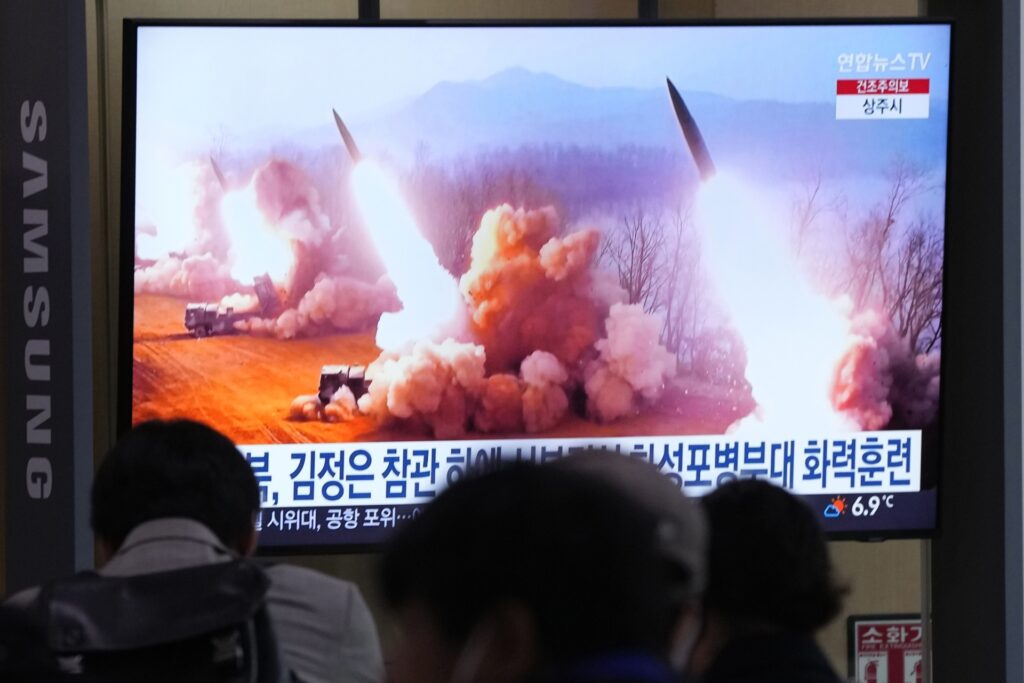
A TV screen shows an image of North Korea’s missiles launch during a news program at the Seoul Railway Station in Seoul, South Korea, Friday, March 10, 2023. (AP Photo/Ahn Young-joon)
Now, nuclear weapons development is one of the most popular political proposals in South Korea. Reuters noted in its interview with Oh the results of a recent poll by the firm Data Research finding 70 percent of South Koreans supported a Korean nuclear weapons program; relatedly, 59 percent said they believed that, in the event of the Korean War resuming active hostilities, North Korea would use nuclear bombs on South Korean soil. Support for nuclear weapons, Reuters noted, was “unprecedented” in the country.
The poll is consistent with previous results. In February, the Chicago Council on Global Affairs found 71 percent of South Koreans supporting a nuclear weapons program.
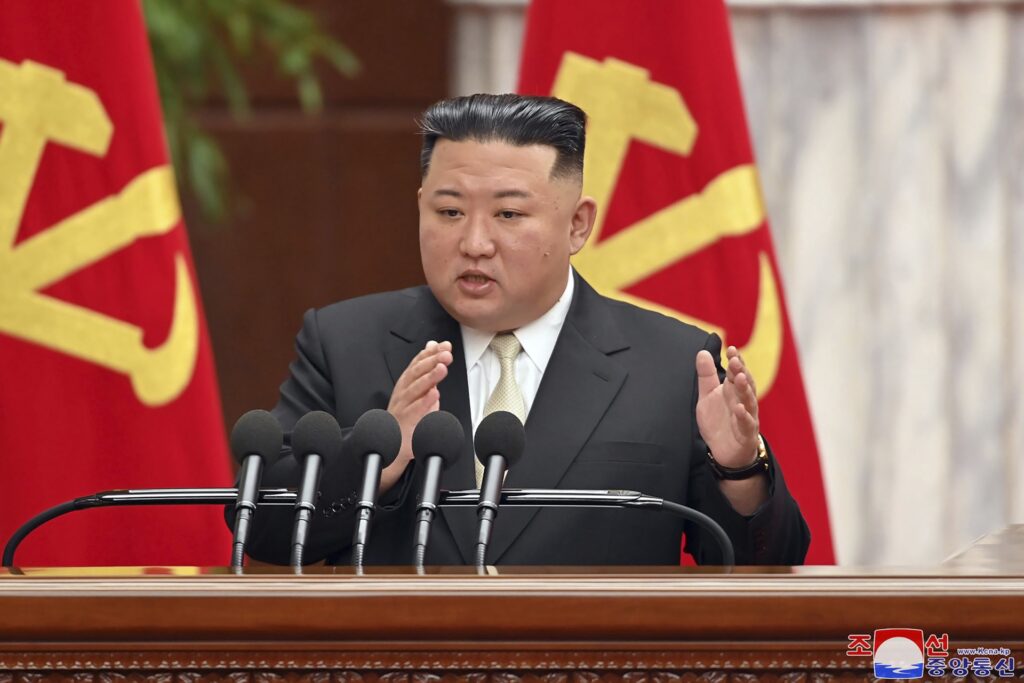
In this photo taken during Feb. 26 – March 1, 2023, and provided by the North Korean government, North Korean leader Kim Jong-un speaks during a meeting of the ruling Workers’ Party at its headquarters in Pyongyang, North Korea. (Korean Central News Agency/Korea News Service via AP)
“When asked to choose between a domestic nuclear weapons program and the stationing of U.S. nuclear weapons in South Korea, similar to that of the past, the public overwhelmingly preferred an independent arsenal,” the Washington Post reported last year, “underscoring the desire among South Koreans for greater autonomy over how and when nuclear weapons would be deployed on their behalf.”
In his remarks to Reuters, Oh, a member of the ruling conservative People Power Party, appeared to hint at this by suggesting that it has become “difficult” to argue against those promoting the establishment of the country as a nuclear power.
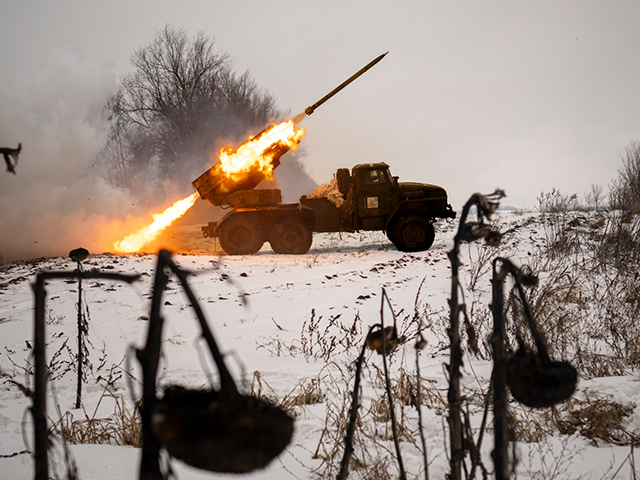
Ukrainian military fires from a multiple rocket launcher at Russian positions in the Kharkiv area, Ukraine, Saturday, Feb. 25, 2023. (AP Photo/Vadim Ghirda)
“North Korea has nearly succeeded in miniaturising and lightening tactical nuclear weapons and secured at least dozens of warheads,” Oh told Reuters. “We’ve come to a point where it is difficult to convince people with the logic that we should refrain from developing nuclear weapons and stick to the cause of denuclearisation.”
“There may be some initial resistance from the international community, but I believe that it will gain more support eventually,” Oh added, meaning resistance to the idea of South Korea joining the community of nuclear-armed states.
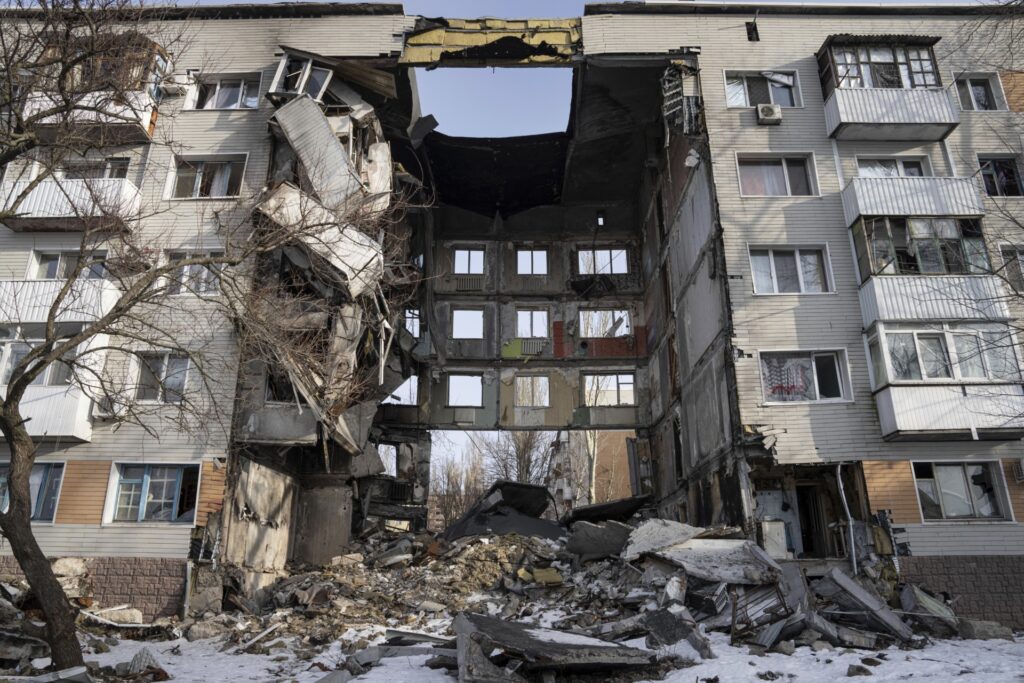
An apartment building destroyed by Russian forces is seen in Bakhmut, Ukraine, Friday, February 24, 2023. (AP Photo/Evgeniy Maloletka)
Oh reportedly cited Ukraine’s situation as indicative of the risk that South Korea would take if it continued to rely on other countries with nuclear weapons to protect it.
“Russia freely violates Ukraine’s airspace, flying bombers and firing missiles,” Oh was quoted as saying, “but Ukraine barely attacks Russian territory because of the psychological inferiority to a nuclear state.”
Ukraine was a nuclear power when it became a sovereign state after the collapse of the Soviet Union, but abandoned its nuclear program in 1994 in exchange for America, the United Kingdom, and Russia vowing “security guarantees” for the country. Two decades later, in 2014, Russia invaded Ukraine, colonizing its Crimean peninsula and fueling a now nine-year-old war in the eastern Donbass region. Russian leader Vladimir Putin suspended Russia’s commitments to limit nuclear weapons production as part of its New START agreement with America last month.
North Korea has not considered any global pleas to stop its illegal nuclear weapons development. On the contrary, dictator Kim Jong-un called for an “exponential increase of the country’s nuclear arsenal” in his end-of-year remarks in 2022.
“Now that the south [sic] Korean puppet forces who designated the DPRK [North Korea] as their ‘principal army’ and openly trumpet about ‘preparations for war’ have assumed our undoubted enemy,” Kim proclaimed, according to the state-run Korean Central News Agency (KCNA), “it highlights the importance and necessity of a mass-producing of tactical nuclear weapons and calls for an exponential increase of the country’s nuclear arsenal.”
The administration of South Korean President Yoon Suk-yeol has responded to the threats by demanding more access to American nuclear weapons.
“While the nuclear weapons belong to the US, intel sharing, planning, and training should be done jointly,” Yoon said in January, a request the Biden administration has yet to grant at press time.
A week later, Yoon suggested greenlighting domestic nuclear weapons development.
“The Republic of Korea could deploy tactical nuclear weapons or possess its own nukes,” the South Korean news outlet Yonhap quoted Yoon as saying at the time.
A spokesman for the Blue House, Yoon’s office, urged reporters to interpret the president’s comments as Yoon merely “stating his firm commitment amid the escalating threat of North Korea’s nuclear weapons.”
In addition to contemplating nuclear development, South Korea’s Defense Acquisition Program Administration (DAPA) confirmed on Monday that the government has plans to purchase American F35A fighter jets to the tune of $2.8 billion and a missile interceptor system manufactured by defense corporation Raytheon.
Yoon’s party has increasingly suggested nuclear development.
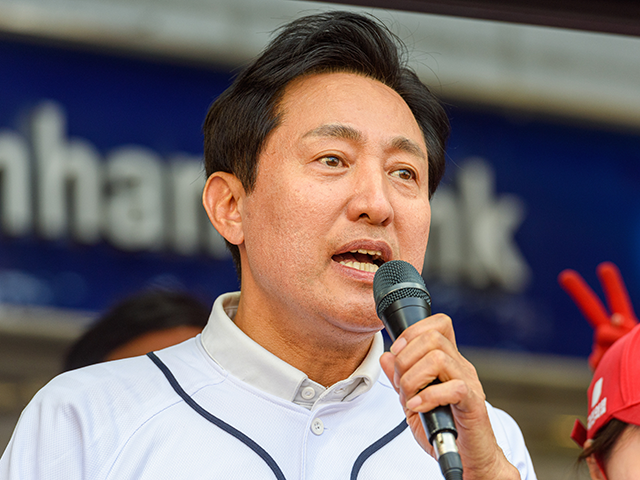
COMMENTS
Please let us know if you're having issues with commenting.